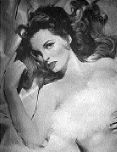“Where did my innocence go?” Olivia Newton-John asked that question in “A Little More Love,” but it was the passing of a different singer-actress, Julie London—who died October 18 at 74—that triggered the same query in my brain last week.
As nurse Dixie McCall on the television show Emergency, London was the first star to register on my radar as a tot. Although I dug paramedics Gage and DeSoto, the real excitement began when the action cut to Rampart Hospital, where Dixie—with her thick black eyeliner and frosted honey-blonde hair—kept staff and patients in line with a one-of-the-guys demeanor that couldn’t curtail London’s smoldering sex appeal.
Dixie was a woman who’d tasted life. She was a Ms., not a Miss or a Mrs. And she didn’t get to be head nurse by just fluttering her false eyelashes, either. In one episode, Dixie asked an injured hoodlum if he’d been using “horse.” When the delinquent feigned innocence, she grabbed his arm and inspected its underside. “So what have you been shooting?” she fired back. “Milk?”
Julie had been around the block, too, by the time Emergency premiered in 1972. The show was produced by her ex-husband, Dragnet star Jack Webb, and costarred her second husband, songwriter Bobby Troup (who died last year), as colleague Dr. Joe Early. And her five-year run as Dixie came long after her first flush of stardom.
In 1955, a year after divorcing Webb and setting aside a so-so movie career to raise two daughters, she’d scored a national chart hit with “Cry Me A River.” Penned by her former Hollywood high school classmate Arthur Hamilton (legend purports he took inspiration from a geography question about a waterway in Crimea), the melancholy ditty has since been tackled by artists as varied as disco innovator Sylvester, Aerosmith, and Barbra Streisand, but the song belongs to London.
Julie Is Her Name, which featured “Cry Me a River,” was just one of over 30 best-selling albums she made during a 12-year period. By her own admission, her pipes were limited. “It’s only a thimbleful of a voice,” she told Life, “and I have to use it close to the microphone. But it is a kind of oversmoked voice, and it automatically sounds intimate.” London’s delivery was understatement personified; she makes Peggy Lee sound like a finalist in a hog-calling contest.
I learned about Julie’s singing career long after Emergency went off the air. In college, my first serious boyfriend discovered her records while visiting New York. “She’s kind of like a female Frank Sinatra,” he reported, by which he apparently meant that she was never without a cigarette in her hand and that concept albums—Latin in a Satin Mood; About the Blues; the Cole Porter collection All Through the Night—were her forte.
With titles like Nice Girls Don’t Stay for Breakfast and cheesecake LP jackets, London’s record company was clearly targeting the bachelor market. Yet her musical appeal remains surprisingly universal. Drama queens who eschew scenery-chewing divas like Shirley Bassey are encouraged to explore the postbreakup set Love on the Rocks. I still associate this ’62 classic with that college boyfriend, who during the same Big Apple visit which introduced us to Julie, found himself smitten with another man, forcing me to realize that “happily ever after” truly was just fairy-tale fare.
In 1991, when Rhino Records released Time for Love: The Best of Julie London, I vowed to interview the reclusive star. She hadn’t made an album since the 1969 misfire Yummy, Yummy, Yummy, featuring ill-advised readings of Bob Dylan and the Doors, and her final movie role had been in a forgettable 1978 airplane flick, Survival on Charter No. 220. I convinced an editor at Life that London, who’d graced their February 18, 1957, cover, was a plum candidate for a “Where is she now?” retrospective.
But Julie, quite contentedly whiling away her days doing crossword puzzles and reading voraciously, wanted no part of my scheme. Through Troup, the message came back that she was flattered by the request but preferred for fans to remember her as she was. I was crushed. As a last resort, I contemplated sending a dozen roses with a plea to reconsider.
The morning Julie London died, I regretted deciding against the flowers. Because after another decade of listening to her peerless readings of “Fly Me to the Moon” and “The Nearness of You,” I’ve grown to appreciate that her singing is just as captivating when it isn’t seasoned with “some bitters for crying,” ࠬa Love on the Rocks. I’m glad I’m no longer that twentysomething na裂who thought his first relationship would last forever. The music of Julie London showed me that love isn’t meant to be static but is full of ups and downs. I wish I’d expended the effort to thank her for that.






